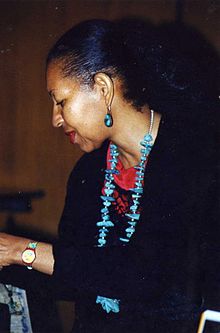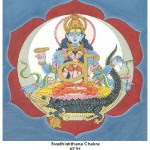3 Ix
White Electric Wizard
In Dreams
She appears –
When the Veil
Is most transparent
Vesica Pisces*
Sacred Vessel
Hoop of two Moons
Meeting Face to Face
Sacred Portal is she
Out of Duality into Reality
Into Unity –
The Absolute
Clan Initiate
Am I now
Given the Mission
For which I’ve prayed
Mystae and Woman-Wise
Full of Poetry and Motion
Pregnant with a Zeitgeist –
Mediatrix of a Vision.
*Sacred Geometry: a pointed oval shape resulting from the intersection of two circles. Used in medieval art and sculpture, especially to enclose a figure of Jesus Christ or the Virgin Mary.
©Kleomichele Leeds
Ai Ogawa
Ai Ogawa (born Florence Anthony; October 21, 1947 – March 20, 2010) was an American poet and educator who won the 1999 National Book Award for Poetry for Vice: New and Selected Poems. Ai is known for her mastery of the dramatic monologue as a poetic form, as well as for taking on dark, controversial topics in her work. About writing in the dramatic monologue form, she's said: "I want to take the narrative 'persona' poem as far as I can, and I've never been one to do things in halves. All the way or nothing. I won't abandon that desire."
Early life
Ai, who described herself as 1/2 Japanese, 1/8 Choctaw-Chickasaw, 1/4 Black, 1/16 Irish and Southern Cheyenne and Comanche, was born in Albany, Texas, in 1947 and she grew up in Tucson, Arizona. She was also raised in Los Angeles, Las Vegas, and San Francisco, with her mother and second stepfather, Sutton Hayes. In 1959, a couple of years after her mother's divorce from Hayes, they moved back to Tucson, Arizona where she completed high school and attended college at the University of Arizona. She majored in English and Oriental Studies with a concentration in Japanese and a minor in Creative Writing, to which she would fully commit toward the end of her degree. Before starting college, one night during dinner with her mother and third stepfather, Ai learned that her biological father was Japanese. Known as Florence Hayes throughout her childhood and undergrad years, it was not until graduate school, when Ai was going to switch her last name back to Anthony that her mother finally told her more details about her past. Learning that her mother had an affair with a Japanese man, Michael Ogawa, after meeting him at a streetcar stop. This led Ai's first stepfather, whose last name was "Anthony," to beat her mother until family intervened and she was taken to Texas, where her stepfather eventually followed after Ai's birth. Because her mother was still legally married to Anthony at the time, his last name was put on Ai's birth certificate.
The poverty Ai experienced during her childhood affected her and her writing. Ai credits her first writing experience to an assignment in her Catholic school English class to write a letter from the perspective of a martyr. Two years after that experience, at the age of 14, she began actively writing.
Career
From 1969 to 1971, Ai attended the University of California at Irvine's M.F.A program where she worked under of Charles Wright and Donald Justice. She is the author of No Surrender, (2010), which was posthumously published after her death, Dread (W. W. Norton & Co., 2003); Vice (1999), which won the National Book Award; Greed (1993); Fate (1991); Sin (1986), which won an American Book Award from the Before Columbus Foundation; Killing Floor (1979), which was the 1978 Lamont Poetry Selection of the Academy of American Poets; and Cruelty (1973).
She also received awards from the Guggenheim Foundation, the National Endowment for the Arts, the Bunting Fellowship Program at Radcliffe College and from various universities. She was a visiting instructor at Binghamton, the State University of New York for the 1973-74 academic year. After winning the National Book Award for Vice she became a tenured professor and the vice president of the Native American Faculty and Staff Association at Oklahoma State University and lived in Stillwater, Oklahoma until her death.
Literary views
Ai had considered herself as "simply a writer" rather than a spokesperson for any particular group. About her own poetry in an interview with Lawrence Kearney and Michael Cuddihy in 1978, she emphasized that there are no "confessional" or autobiographical elements in her work. However, in an interview with Okla Elliott in 2003 after the publication of Dread, she stated that some of the poems and characters in that book are "fictionalized versions" of her family history and that her multi-racial background and interest in history has had a strong influence on her work in this particular collection.
While her work often contains sex, violence, and other controversial subjects, she told Kearney and Cuddihy during that 1978 interview that she did not view her use of them as gratuitous. About the poems in her first collection, Cruelty, she said: "I wanted people to see how they treated each other and themselves." She noted that the difference between the poems in Cruelty and those in Killing Floor is that they deal with her character's whole life rather than a single episode. She described her purpose for writing as "trying to integrate [her] life emotionally and spiritually."
About contemporary American poetry and her own risk-taking in her work, she said: "Perhaps there's a fear of revealing too much emotion in American poetry, despite the go-ahead of a sort from confessional poetry. At any rate, I think that that is my goal—I mean I never want to say 'I have plenty of heart,' but I want to be able to say whatever I feel without fear or embarrassment."
Name change
In 1973, she legally changed her last name to Ogawa and her middle name to "Ai" (愛), which translates to "love" in Japanese, a pen name she had been using since 1969.
Death
Ai was admitted to the hospital on March 17, 2010, for pneumonia. Three days later, Ai died on March 20, 2010, at age 62, in Stillwater, Oklahoma.*
IX
Kin 94: White Electric Wizard
I activate in order to enchant
Bonding receptivity
I seal the output of timelessness
With the electric tone of service
I am guided by the power of endlessness.
The greatest ally on the path is the power of imagination - this is the creative force that fuels our journey.*
*Star Traveler's 13 Moon Almanac of Synchronicity, Galactic Research Institute, Law of Time Press, Ashland, Oregon, 2018-2019.
The Sacred Tzolk'in
Svadhistana Chakra (Kali Plasma)





No comments:
Post a Comment